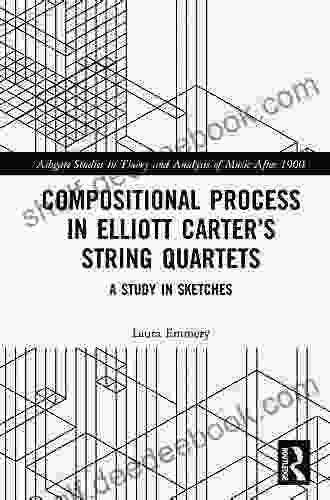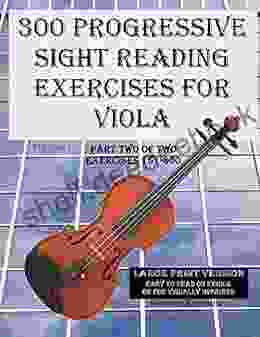Unveiling the Compositional Process in Elliott Carter's String Quartets: A Journey Through Creation

Elliott Carter, one of the most celebrated composers of the 20th century, crafted a significant body of work that reshaped the musical landscape. His string quartets, in particular, stand as testaments to his innovative spirit and mastery of musical composition. This article delves into the intricate compositional process behind Carter's string quartets, exploring the techniques and inspirations that shaped his unique sound and aesthetic.
The Early Years: Laying the Foundation
Born in 1908 in New York City, Carter began composing at an early age, displaying a natural talent for music. He studied composition with Walter Piston and Nadia Boulanger, who played a significant role in shaping his musical development. During these formative years, Carter experimented with various musical styles, including neoclassicism and serialism, before forging his own distinctive path.
5 out of 5
| Language | : | English |
| File size | : | 34686 KB |
| Print length | : | 268 pages |
| Screen Reader | : | Supported |

The String Quartets: A Canvas for Innovation
Over the course of his career, Carter composed four string quartets, each one a testament to his evolving musical language. His First String Quartet, written in 1951, marked a turning point in his style, showcasing his mastery of complex rhythms, polyphony, and counterpoint.
The Second String Quartet: Exploring New Frontiers
In 1959, Carter completed his Second String Quartet, which further expanded the boundaries of his compositional technique. He incorporated elements of chance into the work, using dice rolls to determine the order of certain sections. This innovative approach allowed for a sense of unpredictability and spontaneity, creating a thrilling and engaging musical experience.
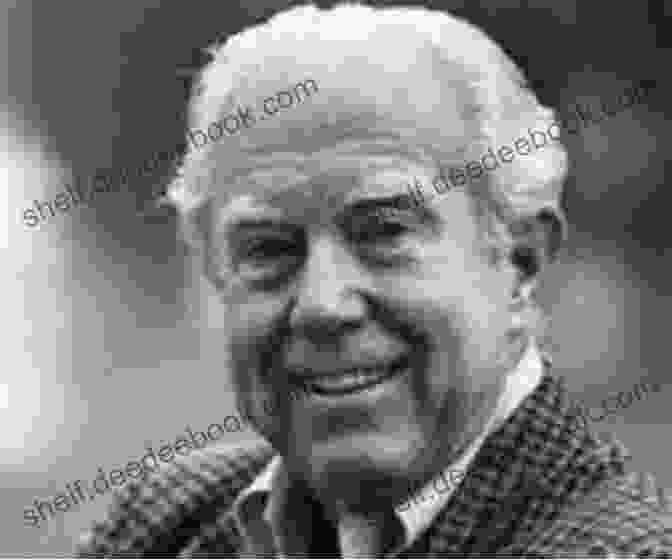
The Third String Quartet: Complexity and Virtuosity
Carter's Third String Quartet, written in 1971, is renowned for its extreme complexity and virtuosity. The piece features intricate rhythmic patterns, dense harmonies, and extended techniques, demanding exceptional skill from the performers. This work pushed the boundaries of string quartet writing, setting a new standard for musical innovation.
The Fourth String Quartet: A Monumental Achievement
Carter's final string quartet, composed in 1995, stands as a monumental achievement in his career. This large-scale work incorporates elements from his previous quartets, showcasing his mastery of both complexity and accessibility. The Fourth String Quartet is a testament to Carter's lifelong commitment to pushing musical boundaries and exploring new possibilities.
Carter's Compositional Technique
Carter's compositional technique was characterized by its precision, clarity, and rhythmic vitality. He meticulously crafted each work, paying attention to the smallest detail. His music often featured intricate counterpoint, with multiple melodic lines interwoven in a complex tapestry of sound.
One of Carter's signature techniques was the use of "metric modulation," where he manipulated the meter of the music to create a sense of rhythmic displacement and instability. This innovative approach added depth and complexity to his compositions, challenging both the listener and the performer.
Inspirations and Influences
Throughout his career, Carter drew inspiration from a wide range of sources, including literature, philosophy, and the visual arts. He was particularly interested in the works of poets such as T.S. Eliot and Ezra Pound, whose use of language and imagery influenced his own musical compositions.
Carter also admired the works of modernist painters such as Jackson Pollock and Mark Rothko. Their abstract and expressionistic styles resonated with his own artistic vision, leading him to explore similar concepts in his music.
"Music is a language that can say things that no other language can."
- Elliott Carter
Legacy and Impact
Elliott Carter's string quartets have had a profound impact on contemporary music. His innovative compositional techniques and groundbreaking aesthetic have inspired generations of composers, both within and outside the realm of string quartet writing.
Carter's music continues to be performed and studied around the world, captivating audiences with its complexity, beauty, and unwavering commitment to artistic excellence. His legado as one of the most significant composers of the 20th century is secure, and his works will continue to inspire and challenge musicians and listeners for years to come.
The compositional process of Elliott Carter's string quartets is a testament to his visionary spirit and unwavering commitment to pushing musical boundaries. Through his innovative techniques, exploration of new frontiers, and myriad inspirations, Carter crafted a body of work that transformed the string quartet genre and left an indelile mark on the musical landscape. As we continue to delve into the depths of his compositions, we are constantly reminded of the power of music to transcend time, inspire creativity, and connect us with the human spirit.
5 out of 5
| Language | : | English |
| File size | : | 34686 KB |
| Print length | : | 268 pages |
| Screen Reader | : | Supported |
Do you want to contribute by writing guest posts on this blog?
Please contact us and send us a resume of previous articles that you have written.
 Book
Book Novel
Novel Page
Page Chapter
Chapter Story
Story Genre
Genre Library
Library Paperback
Paperback Newspaper
Newspaper Sentence
Sentence Bookmark
Bookmark Shelf
Shelf Glossary
Glossary Bibliography
Bibliography Foreword
Foreword Annotation
Annotation Scroll
Scroll Bestseller
Bestseller Library card
Library card Reference
Reference Dictionary
Dictionary Narrator
Narrator Librarian
Librarian Card Catalog
Card Catalog Borrowing
Borrowing Stacks
Stacks Archives
Archives Periodicals
Periodicals Research
Research Lending
Lending Reserve
Reserve Academic
Academic Literacy
Literacy Study Group
Study Group Thesis
Thesis Dissertation
Dissertation Storytelling
Storytelling Reading List
Reading List Theory
Theory Textbooks
Textbooks Jordyn Madison
Jordyn Madison Benjamin Smith
Benjamin Smith Samir Amin
Samir Amin David F Leuchter
David F Leuchter David T Hansen
David T Hansen Rajmohan Gandhi
Rajmohan Gandhi Frank Converse
Frank Converse Derek Clontz
Derek Clontz Susanna Mittermaier
Susanna Mittermaier Nancy L Witherell
Nancy L Witherell Frye Gaillard
Frye Gaillard Mary Kendall
Mary Kendall Howard Jones
Howard Jones Daniel E Monsanto
Daniel E Monsanto Douglas J Amy
Douglas J Amy Grace Palmer
Grace Palmer Brenna Aubrey
Brenna Aubrey Lilli Lehmann
Lilli Lehmann Anne Rice
Anne Rice Timothy K Blauvelt
Timothy K Blauvelt
Light bulbAdvertise smarter! Our strategic ad space ensures maximum exposure. Reserve your spot today!

 Amir SimmonsDiving into the Rhythmic Reimagining: Shondra Quarles' Captivating Nursery...
Amir SimmonsDiving into the Rhythmic Reimagining: Shondra Quarles' Captivating Nursery... Don ColemanFollow ·18.3k
Don ColemanFollow ·18.3k Devin RossFollow ·3.1k
Devin RossFollow ·3.1k Enrique BlairFollow ·14.9k
Enrique BlairFollow ·14.9k Efrain PowellFollow ·10.4k
Efrain PowellFollow ·10.4k Ruben CoxFollow ·19.5k
Ruben CoxFollow ·19.5k Brady MitchellFollow ·2k
Brady MitchellFollow ·2k Miguel de CervantesFollow ·3.8k
Miguel de CervantesFollow ·3.8k Everett BellFollow ·15.2k
Everett BellFollow ·15.2k
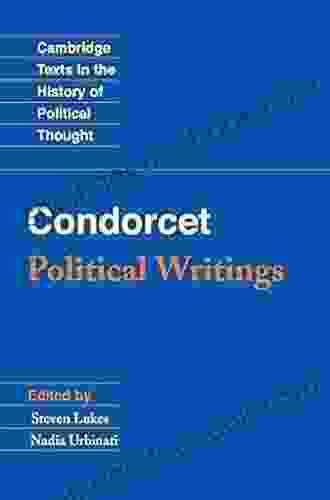
 Beau Carter
Beau CarterLater Political Writings: A Window into the Evolution of...
Political thought, like...

 Tyrone Powell
Tyrone PowellThe Essential Guide to Family School Partnerships:...
: The Importance of...

 Christian Barnes
Christian BarnesAdvancing Folkloristics: Conversations with Jesse...
Dr. Jesse Fivecoate is an...

 Jake Carter
Jake CarterHal Leonard DJ Method Connell Barrett: A Comprehensive...
Are you ready...

 John Updike
John UpdikeCondensed Review of Pediatric Anesthesiology Second...
Condensed Review of...
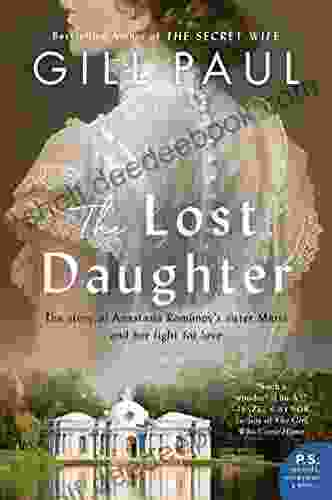
 Guillermo Blair
Guillermo BlairExploring the Complexities of Motherhood and Identity: A...
Elena Ferrante's "The Lost...
5 out of 5
| Language | : | English |
| File size | : | 34686 KB |
| Print length | : | 268 pages |
| Screen Reader | : | Supported |


